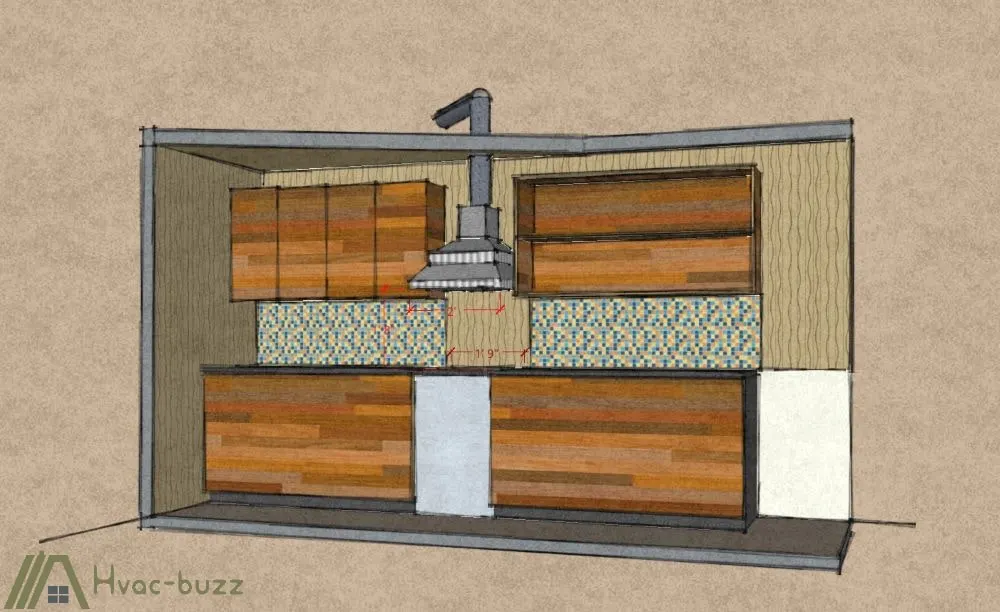Range hoods help out with the mess of cooking grease as well as kitchen odors and moisture in the air. However, not all broilers have integral exhaust systems. So, do you need one?
So, let’s see what the International Residential Code (IRC) says about range hoods, and what the code requirements are for a range hood in Ohio.

Only open-top broilers are required to have a range hood according to the Residential Code of Ohio. This is in line with the International Residential Code. The exception is open-top broilers with integral exhaust systems.
What Does the IRC Say About Range Hoods?
While the IRC discusses installation, ducting, and ventilation for range hoods (or exhaust hoods) in Section M1503, it does not state that a range hood is required, unless you have an open-top broiler.
Here are 5 reasons why it’s important to have a range hood, even though it’s not required by code.
According to the IRC Section M1503.2, if a range hood is installed:
- It must adhere to the Underwriters Laboratories (UL 507) organization safety guidelines.
- Your range hood must fit the required dimensions of your range with sufficient distance between both the hood and the cooking surface and combustible materials.
- It must vent outdoors through an airtight duct of galvanized stainless steel or cooper with a backdraft damper.
- If your exhaust system has higher venting capacities, then an equally capable makeup air system is required.
Range Hoods Required by Local Codes
The Ohio Residential Code Section M1503, adopts the IRC regulations for range hoods, with some adjustments. However, unlike the California local codes, which make significant adaptations to the range hood requirements, there are few significant changes to the Ohio Code in regards to range hoods.
Just as in the IRC, Section M1503.2.1 of the Residential Code of Ohio states the following:
“Domestic open-top broiler units shall be provided with a metal exhaust hood having a thickness of not less than 0.0157″ (0.3950 mm) (No. 28 gauge)….”
Thus, in Ohio, only if you have an open-top broiler, does there need to be a range hood.
Range Hood Requirements
This section also says that your range hood must cover your broiler unit width and must extend over it, and the minimum distance required between cabinets/combustible materials is the following:
- From the range hood: 1/4”.
- From the cooking surface: 24”.
Range hoods must vent outside via a metal, airtight duct with a smooth interior surface, backdraft damper, and with its own exhaust system according to Section M1503.3 and Section M1503.4 of the Ohio Residential Code. Insulation of the ductwork is not a requirement, but it is highly recommended, especially where the ducts pass through unconditioned spaces.

Minimum Required Range Hood Exhaust Rates in Ohio
Fans for domestic exhaust systems must comply with safety guidelines. They must also be appropriately sized, as stated in Ohio Code Section M1503.5, in order to meet the minimum exhaust rates stated in Section M1503.4.4: Minimum exhaust rates for a kitchen: 100 CFM intermittently or 25 CFM continuously.
Make-Up Air Requirements
Where one or more fuel-burning appliances (without a venting system), which is installed in your residence’s air barrier or insulated interior environment is capable of exhausting 400 CFM there must be a makeup air system.
This makeup air system must be able to match the exhaust rate and should be located in the same room or in an area that has permanent openings to the room.
At least one gravity or electric damper is required for the makeup air system, which opens automatically when the exhaust system is on. Although, according to Ohio Code Section M1503.6.2, gravity and barometric dampers should not be used with passive makeup air systems unless they will provide airflow at a pressure differential of 0.01 w.c.
These dampers must be easily accessible for inspection, repair, service, and replacement.
The Exception
The exception is as follows, according to Ohio Code Section M1503.2.1:
“Broiler units that incorporate an integral exhaust system, and that are listed and labeled for use without an exhaust hood, shall not be required to have an exhaust hood.”
So if your broiler comes with an exhaust system in-built and is therefore designed to deal with the air contaminants without a range hood, you do not need to install one.
If you are looking for a good range hood, check out my article on the amazing range hoods made locally in the USA.
Related article: Is a Range Hood Required by Code in Colorado
Related article: Is a Range Hood Required by Code in North Carolina
Sources
https://codes.iccsafe.org/content/IRC2021P1/chapter-15-exhaust-systems#IRC2021P1_Pt05_Ch15_SecM1503
https://up.codes/viewer/ohio/irc-2018/chapter/15/exhaust-systems#15

